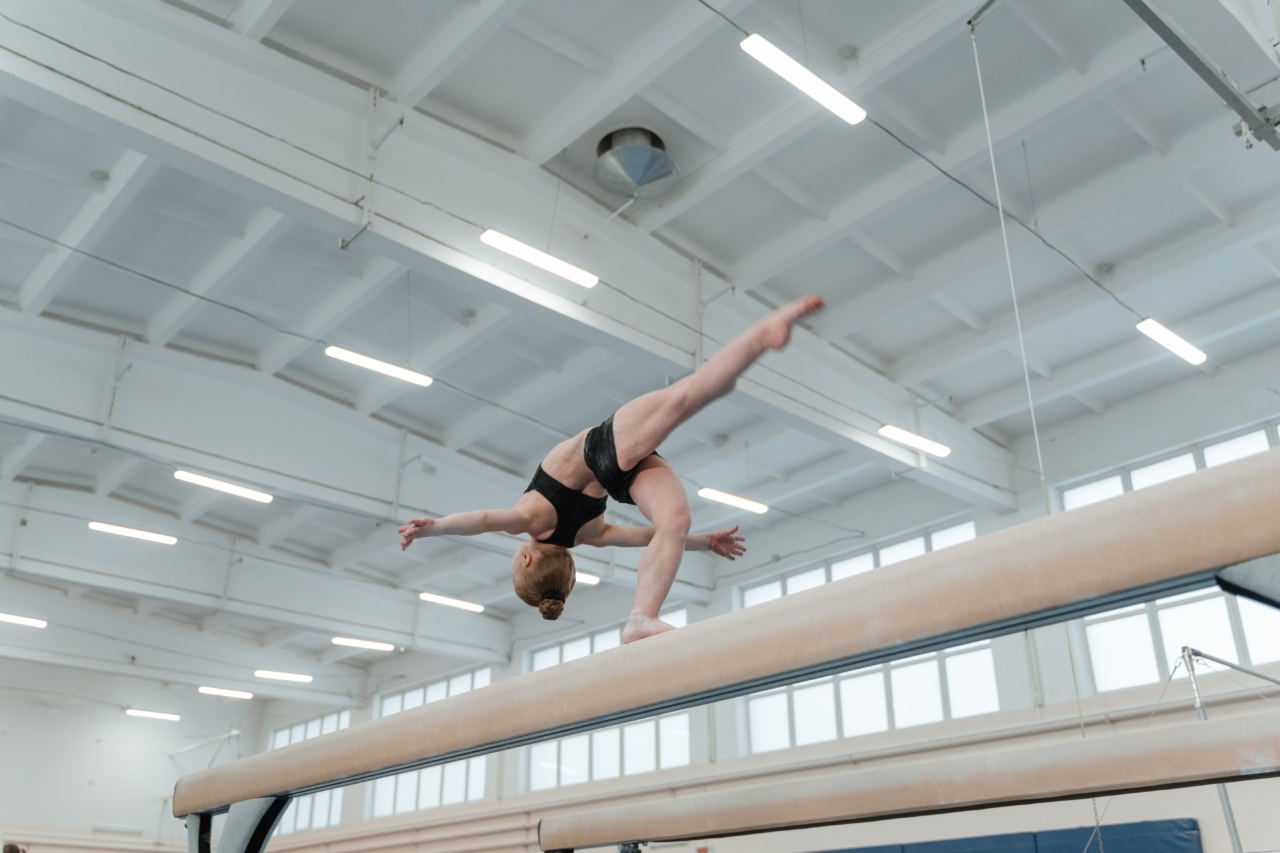Gymnastics is a physically demanding sport that requires athletes to have both strength and finesse. It involves performing various acrobatic moves, flips, and routines on apparatus such as the balance beam, uneven bars, vault, and floor exercise.
To excel in gymnastics, athletes must maintain a strict training regimen, which is often accompanied by a rigorous diet. However, finding the right balance between proper nutrition and performance can be a challenging task for gymnasts.
The importance of nutrition in gymnastics
Nutrition plays a vital role in any athlete’s performance, and gymnastics is no exception. To perform at their best, gymnasts need to fuel their bodies with the right nutrients.
These nutrients provide energy, promote muscle recovery, and help prevent injuries. Proper nutrition also aids in maintaining the optimal weight and body composition necessary for executing intricate movements with precision.
Interestingly, gymnastics is a sport where aesthetics are often emphasized. Athletes are expected to have a lean and toned physique, which can lead to additional pressures regarding body image and dieting.
However, it is crucial to remember that extreme dieting or inadequate nutrition can have severe consequences on both performance and overall health.
The energy demands of gymnastics
Gymnastics requires explosive power, endurance, and flexibility. Gymnasts perform intense routines that require bursts of energy, as well as the ability to sustain their strength and focus throughout the entire performance.
To meet these demands, gymnasts need to consume an appropriate amount of calories, carbohydrates, proteins, and fats.
Carbohydrates are the primary source of energy for the body during exercise. They are stored in the muscles and liver as glycogen and provide quick energy when needed.
Gymnasts should include complex carbohydrates such as whole grains, fruits, and vegetables in their diet to ensure a sustained release of energy.
Proteins are essential for muscle repair and recovery. Gymnasts frequently engage in strength training exercises that lead to muscle damage. Adequate protein intake helps repair and build muscle, thus enhancing performance and preventing injuries.
Fats, although often misunderstood, are also a necessary component of a gymnast’s diet. Healthy fats support hormone production, vitamin absorption, and joint health. Good sources of healthy fats include avocados, nuts, and fatty fish.
The challenges of meeting nutritional needs
Despite understanding the importance of proper nutrition, gymnasts often face various challenges when it comes to meeting their dietary needs.
Time constraints
Gymnasts typically train for long hours, leaving little time for meal preparation. This can lead to reliance on convenience foods or skipping meals altogether, both of which can negatively impact performance and overall health.
Dieting pressures
The pressure to maintain a certain body image can lead gymnasts to restrict their calorie intake or engage in unhealthy dieting practices. This can result in nutrient deficiencies, fatigue, weakened immune function, and an increased risk of injury.
Limited knowledge
Younger gymnasts who are just starting their athletic journey may lack the necessary knowledge and guidance regarding proper nutrition. This can lead to poor food choices or inadequate nutrient intake.
Disordered eating habits
Gymnastics, like many other sports, can be a breeding ground for disordered eating habits. The focus on weight and appearance can contribute to the development of eating disorders such as anorexia or bulimia.
These conditions can have severe consequences on the athlete’s physical and mental health.
Tips for maintaining a healthy balance
While the challenges may seem daunting, it is possible for gymnasts to achieve a healthy balance between their sport and nutrition. Here are some tips to help gymnasts maintain proper nutrition:.
Work with a sports nutritionist
Consulting with a sports nutritionist who specializes in working with gymnasts can provide valuable guidance. They will help develop a personalized nutrition plan that meets the athlete’s unique needs and goals.
Plan meals and snacks in advance
To overcome time constraints, gymnasts can plan and prepare their meals and snacks in advance. This ensures they have access to nutritious options throughout their training sessions and competitions.
Avoid strict diets or extreme calorie restriction
Gymnasts should focus on fueling their bodies with nutrient-rich foods rather than strict diets or extreme calorie restriction. Adequate energy intake is essential for optimal athletic performance and overall well-being.
Choose nutrient-dense foods
Gymnasts should prioritize nutrient-dense foods that provide a wide range of vitamins, minerals, and antioxidants. This includes fruits, vegetables, lean proteins, whole grains, and healthy fats.
Stay hydrated
Hydration is crucial for gymnasts as dehydration can lead to decreased performance and increased risk of injury. Drinking enough water throughout the day and during training sessions is essential for optimal performance.
Listen to your body
Gymnasts should learn to listen to their bodies and recognize hunger and fullness cues. This helps them develop a healthy relationship with food and allows for adjustments in their eating patterns depending on training intensity and rest days.
The mental aspect of nutrition in gymnastics
While physical health is crucial, the mental aspect of nutrition is equally important for gymnasts. Building a positive relationship with food and body image is essential for long-term success and overall well-being.
Gymnasts should strive for self-acceptance and focus on performance rather than appearance. This mindset shift can help reduce the pressure to conform to unrealistic beauty standards and promote a healthy body image.
Eating disorders and disordered eating are prevalent in the gymnastics community. Coaches, parents, and teammates should be vigilant for signs of unhealthy behaviors and provide support to those who may be struggling.
Conclusion
Gymnastics and nutrition are indeed a tough balancing act, but with the right approach, it can be achieved. Proper nutrition is essential for gymnasts to perform at their best, prevent injuries, and maintain overall health.
By addressing the challenges and adopting healthy habits, gymnasts can excel in their sport while nourishing their bodies and minds.































